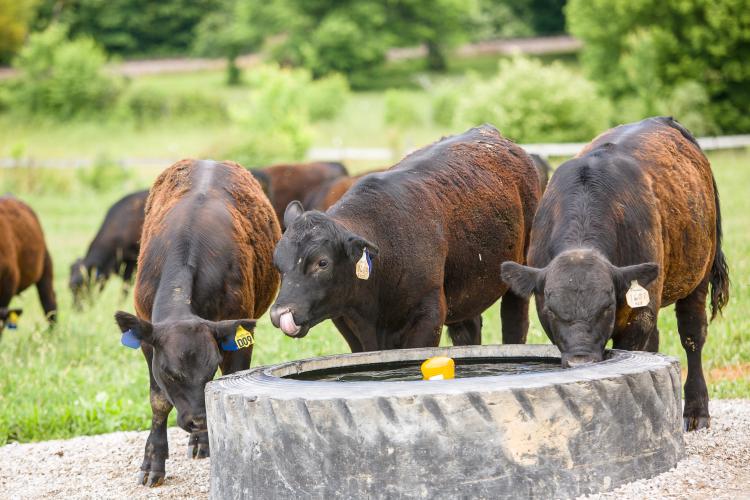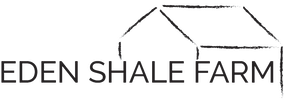|
Keeping cattle cool and comfortable is important for maintaining weight gain, milk production and reproductive performance. The temperatures that cattle prefer, 40 and 65oF, are cooler than what humans prefer, which means cattle display signs of heat stress even in what we would call “cool” temperatures. Signs of severe heat stress can range from slobbering, high respiratory rate (panting), open mouth breathing, lack of coordination, and trembling. Dairy cows can exhibit decreases in milk production due to heat stress at temperatures as low as 72o F and 45% humidity while beef cattle can begin to show signs of heat stress at 77o F. In Kentucky, beef cattle can display signs of heat stress in early spring while dairy cows may show signs much earlier. Cattle need a period of time to acclimate to the ambient temperature.
Heat stress has many negative effects on cattle which result in significantly decreased animal performance. Heat stress affects the reproductive performance of females and males. It takes six weeks after removing the effects of excessive heat for the animal to recover reproductively. Cows often show decreased conception rates, decreased duration and intensity of estrus, decreased calf birth weight, and increased early embryo mortality when experiencing heat stress. Milk production and weight gains are also considerably decreased. Heat stressed cattle spend less time grazing resulting in less feed consumed which partially explains the observed reduction in performance. Any and all operations can be negatively impacted by heat stress. It is important to look ahead in early spring and prepare to reduce heat stress for the grazing season. Cattle should not be worked during times of extreme heat, and during the summer months they should only be worked during early morning while it is cooler. Even when temperatures cool off in the evening, it is not a good idea to work cattle because their core body temperature peaks two hours after the high for the day and it takes cattle at least six hours to dissipate the heat load gained. For instance, if the peak ambient temperature is reached at 4:00 pm, cattle will not have dissipated their heat load until midnight or later. Cattle worked in the early evening will have a greater chance to overheat. Cattle grazing endophyte-infected tall fescue can experience more intense heat stress than cattle grazing other forages. Blood flow to peripheral tissues or skin is reduced which diminishes the animal’s ability to dissipate body heat. A rough hair coat and failure to shed winter coats are common symptoms of fescue toxicity. Body temperature and subsequently respiration rates are increased, increasing maintenance energy needs. Taking steps to reduce fescue toxicity, such as removing livestock from endophyte-infected fescue fields during periods of extreme heat, can also help reduce the severity of heat stress in the herd. Dairy producers often have fans in their barns and holding pens that circulate air and help keep cattle cooler. These fans can be put on a thermostatic switch where they are activated at a certain temperature, and several producers have already seen those fans come on this year. These fans accompanied with sprinkler systems are effective ways in helping keep cattle comfortable while being confined in a barn. These sprinkler systems are designed to wet the cattle’s hair coat completely within 2 minutes and remain off for the remaining 12 to 15 minutes of the sprinkler cycle and fans run continuously to help evaporate the water from the cow’s hair coat. A “mist”-type system is not recommended in Kentucky because with our humidity the mist creates a steam bath effect which increases heat stress. Allowing cattle access to shade, and cool water at all times is vital to reduce heat stress. Trees are a valuable source of shade that is inexpensive to producers. Cattle need a minimum of 20 to 40 square feet of shade per animal to be comfortable. The height of artificial shade structures should be at least eight feet tall to allow sufficient air movement under the shade. Another option is to turn cattle out to pastures without shade at night, and allow access to pasture fields with shade during the day. Reducing heat stress in the herd will increase animal performance and overall profitability. For more information on fan and sprinkler systems see http://www2.ca.uky.edu/agc/pubs/aen/aen75/aen75.pdf Article provided by: MASTER GRAZER an educational program to improve grazing practices in beef, dairy, goat and sheep herds Comments are closed.
|
Archives
June 2024
Categories
All
Welcome |
CONTACT US |
EMAIL SIGN UP |
|
Eden Shale Farm
245 Eden Shale Rd. Office: (859) 278-0899 Owenton, KY 40359 Fax: (859) 260-2060 © 2021 Kentucky Beef Network, LLC.. All rights reserved.
|
Receive our blog updates
|


 RSS Feed
RSS Feed
